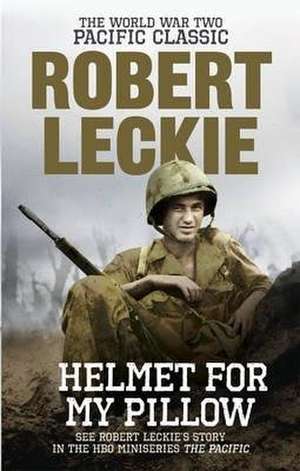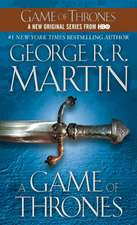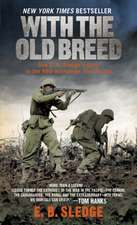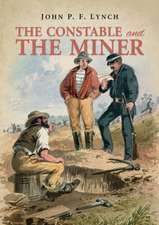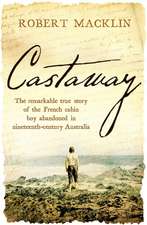Helmet for my Pillow
Autor Robert Leckieen Limba Engleză Paperback – 3 feb 2011
| Toate formatele și edițiile | Preț | Express |
|---|---|---|
| Paperback (2) | 68.22 lei 25-31 zile | +23.29 lei 5-11 zile |
| Ebury Publishing – 3 feb 2011 | 68.22 lei 25-31 zile | +23.29 lei 5-11 zile |
| Bantam – 31 ian 2010 | 115.27 lei 22-36 zile |
Preț: 68.22 lei
Preț vechi: 81.96 lei
-17% Nou
13.06€ • 14.19$ • 10.98£
Carte disponibilă
Livrare economică 03-09 aprilie
Livrare express 14-20 martie pentru 33.28 lei
Specificații
ISBN-10: 0091937515
Pagini: 320
Ilustrații: maps, ports.
Dimensiuni: 128 x 198 x 22 mm
Greutate: 0.23 kg
Editura: Ebury Publishing
Recenzii
Notă biografică
Robert Leckie was born on December 18, 1920 in Philadelphia. After enlisting in the United States Marine Corps shortly after the attack on Pearl Harbor, he worked in the 1st Marine Division as a machine gunner and as an intelligence scout during the Battle of Guadalcanal. He was later awarded the Purple Heart. Helmet for My Pillow received the Marine Corps Combat Correspondents' Annual Award in 1957. He died in December 2001.
Descriere
“One hell of a book! The real stuff that proves the U.S. Marines are the greatest fighting men on earth!” Leon Uris
Robert Leckie signed up for service with the United States Marines on January 5, 1942.
Wake Island had fallen and America was still reeling from the tragedy of Pearl Harbor.
This vivid and personal account of one marine’s journey through the course of the war in the Pacific in World War Two.
Leckie provides vivid, and at times humorous, details of his training in South Carolina, through to being assigned to first terrifying duties as a fighting marine.
He was thrust into the heat of battle at Guadalcanal before seeing action across many islands of the Pacific until he was eventually wounded and evacuated from the island of Peleliu.
Yet this fascinating autobiography is not simply about Leckie’s fighting life over the duration of the war as it also records the camaraderie of his fellow soldiers, the adventures that he enjoyed during his time off service in Melbourne, Australia, along with the day to day life of a normal marine.
“Helmet for My Pillow is a grand and epic prose poem. Robert Leckie’s theme is the purely human experience of war in the Pacific, written in the graceful imagery of a human being who — somehow — survived.” Tom Hanks
This work is essential reading for anyone interested in uncovering the voice of a true marine who saw some of the bloodiest battles of World War Two.
Along with E. B. Sledge’s With the Old Breed: At Peleiu and Okinawa this book formed the basis for the HBO miniseries The Pacific.
Robert Leckie was an American author and historian. His service with the 1st Marine Division in World War Two as a machine gunner and a scout greatly influenced his later work. Helmet for my Pillow was first published in 1957 and Leckie passed away in 2001.
Extras
Boot
A cutting wind slanted up Church Street in the cheerless dawn of January 5, 1942. That day I departed for the United States Marines.
The war with Japan was not yet four weeks old, Wake Island had fallen. Pearl Harbor was a real tragedy, a burning bitter humiliation. Hastily composed war songs were on the lips of everyone, their heavy patriotism failing to compensate for what they lacked in tune and spirit. Hysteria seemed to crouch behind all eyes.
But none of this meant much to me. I was aware of my father beside me, bending into the wind with me. I could feel the wound in my lower regions, still fresh, still sore. The sutures had been removed a few days earlier.
I had sought to enlist the day after Pearl Harbor, but the Marines had insisted that I be circumcised. It cost me a hundred dollars, although I am not sure to this day whether I paid the doctor or not. But I am certain that few young men went off to war in that fateful time so marked.
We had come across the Jersey meadows, riding the Erie commuter line, and then on the ferry over the Hudson River to downtown New York. Breakfast at home had been subdued. My mother was up and about; she did not cry. It was not a heart-rending leave-taking, nor was it brave, resolute—any of those words that fail to describe the thing.
It was like so much else in this war that was to produce unbounded heroism, yet not a single stirring song: it was resigned. She followed me to the door with sad eyes and said, “God keep you.”
It had been a silent trip across the meadows and it was a wordless good-by in front of the bronze revolving doors at Ninety, Church Street. My father embraced me quickly, and just as quickly averted his face and left. The Irish doorman measured me and smiled.
I went inside and joined the United States Marines.
The captain who swore us in reduced the ceremony to a jumble. We all held up our hands. We put them down when he lowered his. That way we guessed we were marines.
The master gunnery sergeant who became our momentary shepherd made the fact plainer to us. Those rich mellow blasphemous oaths that were to become so familiar to me flowed from his lips with the consummate ease of one who had spent a lifetime in vituperation. I would meet his masters later. Presently, as he herded us across the river to Hoboken and a waiting train, he seemed to be beyond comparison. But he was gentle and kind enough when he said good-by to the thirty or forty of us who boarded the train.
He stood at the head of our railroad car—a man of middle age, slender, and of a grace that was on the verge of being ruined by a pot belly. He wore the Marine dress blues. Over this was the regulation tight-fitting overcoat of forest green. Green and blue has always seemed to me an odd combination of colors, and it seemed especially so then; the gaudy dark and light blue of the Marine dress sheathed in sedate and soothing green.
“Where you are going it will not be easy,” the gunnery sergeant said. “When you get to Parris Island, you’ll find things plenty different from civilian life. You won’t like it! You’ll think they’re overdoing things. You’ll think they’re stupid! You’ll think they’re the cruelest, rottenest bunch of men you ever ran into! I’m going to tell you one thing. You’ll be wrong! If you want to save yourself plenty of heartache you’ll listen to me right now: you’ll do everything they tell you and you’ll keep your big mouths shut!”
He could not help grinning at the end. No group of men ever had a saner counselor, and he knew it; but he could not help grinning. He knew we would ignore his every word.
“Okay, Sarge,” somebody yelled. “Thanks, Sarge.”
He turned and left us.
We called him “Sarge.” Within another twenty-four hours we would not dare address a lowly Pfc. without the cringing “sir.” But today the civilian shine was still upon us. We wore civvies; Hoboken howled around us in the throes of trade; we each had the citizen’s polite deprecation of the soldier, and who among us was not certain that he was not long for the ranks?
Our ride to Washington was silent and uneventful. But once we had arrived in the capital and had changed trains the atmosphere seemed to lift. Other Marine recruits were arriving from all over the east. Our contingent was the last to arrive, the last to be crammed aboard the ancient wooden train that waited, puffing, dirty-in-the-dark, smelling of coal—waited to take us down the coast to South Carolina. Perhaps it was because of the dilapidated old train that we brightened and became gay. Such a dingy, tired old relic could not help but provoke mirth. Someone pretended to have found a brass plate beneath one of the seats, and our car rocked with laughter as he read, “This car is the property of the Philadelphia Museum of American History.” We had light from kerosene lamps and heat from a potbellied stove. Draughts seemed to stream from every angle and there was a constant creaking and wailing of wood and wheels that sounded like an endless keening. Strange old train that it was, I loved it.
Comfort had been left behind in Washington. Some of us already were beginning to revel in the hardship of the train ride. That intangible mystique of the marine was somehow, even then, at work. We were having it rough, which is exactly what we expected and what we had signed up for. That is the thing: having it rough. The man who has had it roughest is the man to be most admired. Conversely, he who has had it the easiest is the least praiseworthy.
Those who wished to sleep could cat-nap on the floor while the train lurched down through Virginia and North Carolina. But these were few. The singing and the talk were too exciting.
The boy sitting next to me—a handsome blond-haired youth from south Jersey—turned out to have a fine high voice. He sang several songs alone. There being a liberal leavening of New York Irish among us, he was soon singing Irish ballads.
Across the aisle there was another boy, whom I shall call Armadillo because of his lean and pointed face. He was from New York and had attended college there. Being one of the few college men present, he had already established a sort of literary clique.
The Armadillo’s coterie could not equal another circle farther down the car. This had at its center a stocky, smiling redhead. Red had been a catcher for the St. Louis Cardinals and had once hit a home run at the Polo Grounds off the great Carl Hubbell.
There was no measuring the impact of such a celebrity on our group, composed otherwise of mediocrities like myself. Red had been in the big time. He had held daily converse with men who were nothing less than the idols of his newfound comrades. It was quite natural they should ring him round; consult him on everything from pitching form to the Japanese General Staff.
“Whaddya think it’ll be like at Parris Island, Red?”
“Hey, Red—you think the Japs are as tough as the newspapers say they are?”
It is an American weakness. The success becomes the sage. Scientists counsel on civil liberty; comedians and actresses lead political rallies; athletes tell us what brand of cigarette to smoke. But the redhead was equal to it. It was plain in his case what travel and headlines can do. He was easily the most poised of us all.
But I suspect even Red’s savoir-faire got a rude jolt when we arrived in Parris Island. We had been taken from the railroad station by truck. When we had dismounted and had formed a motley rank in front of the red brick mess hall, we were subjected to the classic greeting.
“Boys,” said the sergeant who would be our drill instructor. “Boys—Ah want to tell yawl something. Give youah hearts to Jesus, boys—cause youah ass belongs to me!”
Then he fell us in after our clumsy civilian fashion and marched us into the mess hall.
There were baloney and lima beans. I had never eaten lima beans before, but I did this time; they were cold.
The group that had made the trip from New York did not survive the first day in Parris Island. I never saw the blond singer again, nor most of the others. Somehow sixty of us among the hundreds who had been aboard that ancient train, became a training platoon, were assigned a number and placed under the charge of the drill sergeant who had delivered the welcoming address.
Sergeant Bellow was a southerner with a fine contempt for northerners. It was not that he favored the southerners; he merely treated them less sarcastically. He was big. I would say six feet four inches, two hundred thirty pounds.
But above all he had a voice.
It pulsed with power as he counted the cadence, marching us from the administration building to the quartermaster’s. It whipped us, this ragged remnant, and stiffened our slouching civilian backs. Nowhere else but in the Marine Corps do you hear that peculiar lilting cadence of command.
“Thrip-faw-ya-leahft, thrip-faw-ya-leahft.”
It sounds like an incantation; but it is merely the traditional “three-four-your-left” elongated by the southern drawl, made sprightly by being sung. I never heard it done better than by our sergeant. Because of this, and because of his inordinate love of drill, I have but one image of him: striding stiff-backed a few feet apart from us, arms thrust out, hands clenched, head canted back, with the whole body following and the great voice ceaselessly bellowing, “Thrip-faw-ya-leahft, thrip-faw-ya-leahft.”
Sergeant Bellow marched us to the quartermaster’s. It was there we were stripped of all vestiges of personality. It is the quartermasters who make soldiers, sailors and marines. In their presence, one strips down. With each divestment, a trait is lost; the discard of a garment marks the quiet death of an idiosyncrasy. I take off my socks; gone is a propensity for stripes, or clocks, or checks, or even solids; ended is a tendency to combine purple socks with brown tie. My socks henceforth will be tan. They will neither be soiled, nor rolled, nor gaudy, nor restrained, nor holey. They will be tan. The only other thing they may be is clean.
So it is with it all, until one stands naked, struggling with an embarrassment that is entirely lost on the laconic shades who work in quartermaster sheds.
Within—in the depths the psychiatrists call subliminal—a human spark still sputters. It will never go quite out. Its vigor or its desuetude is in exact proportion to the number of miles a man may put between himself and his camp.
